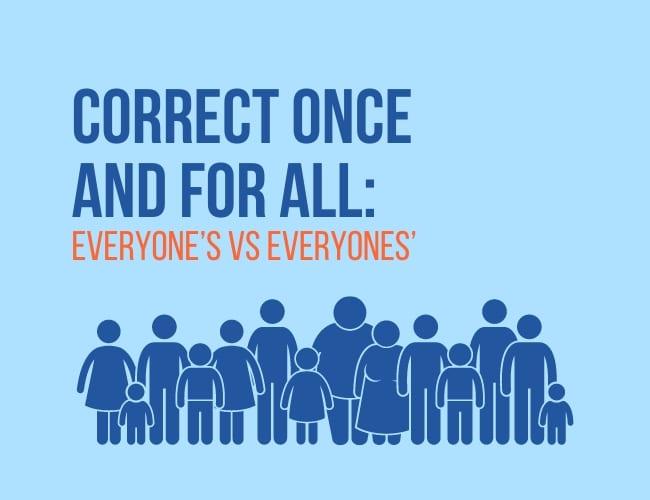When you want to give ownership of something to everyone, how do you write it? Everyone's vs everyones'? Let's solve this grammar error once and for all.

“Everyone's job is no one's job.” Have you ever heard this maxim? It's used in leadership circles to remind managers to assign tasks to specific people rather than making general statements that diffuse responsibility.
It's one thing hear the advice and another thing to follow it. It's also another thing to write it.
Is it everyone's? Or everyones? Maybe everyones'? How do you know? Let's clear this up.
Definition of everyone's
Over time, English speakers combined two words, “every” and “one,” in a compound, everyone. It means each and every individual person, i.e., all people, except when it's used hyperbolically for effect: “Everyone knows how to spell everyone's.” Obviously, if a single person doesn't know, then not everyone knows.
So far so good, but we're looking at “everyone's,” not “everyone.”
“Everyone's” is a possessive and expresses the idea that a fact or thing belongs to all people. That's one of the functions of apostrophe -s in English.
Why does everyone's confuse writers?
Simple, right? Not so fast. “Everyone's” combines several conventions in a single word, and all of these conventions have potential for confusion. Here are the problems.
It's a grammatically singular pronoun with a plural meaning, but it has no plural form.
It's a pronoun, and pronouns confuse many people.
It's a possessive pronoun, and those really confuse people.
The possessive form is identical to the contraction.
How's that for confusing? Let's take a look at the issues one at a time.
Pronouns
Pronouns are words that take the place of nouns. We find it stylistically odd to use a noun repeatedly. “The car appeared out of nowhere. I didn't see the car until the last second. The car blended into the scenery. The car was traveling at a high rate of speed. The car was on my side of the road.”
Getting tired of reading “the car” in every sentence? To avoid this, we use pronouns for variety. “The car appeared out of nowhere. I didn't see it until the last second.”
What is an indefinite pronoun?
“Everyone” belongs to a special class of pronouns, called indefinite pronouns. “He,” “she,” “it,” etc. refer to specific individuals, but “everyone” is ambiguous, or indefinite. Sure, it could refer to all individuals in a group, but as we have seen, it can refer to “most people” or “a large number of people.” How's that for indefinite?
Plurals
Further compounding the problem, the word is collective, i.e., plural in meaning, but singular in form. Collective nouns cause confusion, but collective pronouns cause even more. Remember that words with every (e.g., everyone, everybody, everything, everywhere) act like singular words even though they refer to multiple persons, places, and things.
Possessives (or the possessive form)
And then there's the apostrophe -s. English uses the apostrophe for two reasons: to indicate possession and to show omission. This often results in identical forms with different meaning.
Apostrophe -s can herald a contraction with “is/was” or “has” as well as signal possession. Thus, “Susie's” can mean “Susie is,” “Susie was,” “Susie has,” or “Susie owns.” Similarly, “everyone's” could be “everyone is/was,” “everyone has,” or “everyone owns.” Context should make clear which.
Pronouns, on the other hand, usually don't use the apostrophe for possession. We have special forms: his, her/s, our/s, their/s, your/s, its. (The slashes indicate there are two forms, one for when the pronoun precedes the possession and one when it stands alone.) For example, “That's our house,” but “The house is ours.”
Indefinite pronouns, however, follow the usual apostrophe rule for possession: add apostrophe -s.
As a result, we get “everyone's,” “no one's,” “everybody's,” and “nobody's.”
The trick is to remember that everyone follows the general rule for possessives: add apostrophe -s.
This is also why everyones' is never correct. Because there isn't a plural form of everyone.
Maxim: “Everyone's” is the only correct possessive for everyone.
A couple of examples:
Everyone's greatest fear is misspelling everyone's.
I need everyone's attention for an important announcement.
Bob and Sally are everyone's favorite aunt and uncle.
There you have it. Now everyone's been taught the correct way to write everyone's versus everyones'. Right?
If you want to work on more practice, check out our most current articles on grammar.
What other grammar concepts and spelling conundrums haunt you (or alternately, maybe you see them written incorrectly often)? Share in the comments.
PRACTICE
Now you try it. Set aside fifteen minutes to write a couple of paragraphs that deal with things everyone possesses. Use “everyone's” and spice it up with “everybody's,” “no one's,” and “nobody's.” Share your results in the Pro Practice Workshop here. If you share, leave feedback for a few other writers too!
Not a member? Join us!

Robert Harrell
Robert Harrell is a grammar nerd—and a language teacher, medieval re-creationist, musician, traveler, and theologian. His interests inform his stories and coaching. Published in German, Spanish, and French, with two English-language YA/NA series underway, Robert is pursuing The Write Practice Book Coach Certification to help other writers excel. Learn more at his website.




“Everyone’s heart is the same color” ( is that grammatically correct? )
The every+nouns are unnecessary and inefficient contractions outside of the historically dated space/cost saving ploy of printing. To claim indefinite properties while also claiming root origin of the very clear-cut posessive of “every one” is quite a stretch. The grammar has to evolve with the usage.
“Everyone’s” Contraction of
everyone is.
Everyone’s beautiful
“Everyones” Implied and definative posessive plurality similar to ‘theirs’ in its plural form
“Responsibility is everyones to uphold”
“Every One” A return of the space between the 2 and removal of the confusing dual plurality to specify the entirety of collective single entities
“Every one contributed to the common goal”
Only gangsters in movies say “Every ones”
I have never used apostrophe ‘s’ as a contraction of ‘was’ or ‘has’. ie. I would never shorten ‘Susie was tall’ to Susie’s tall (this reads as ‘Susie IS tall’ to me) or ‘Susie has a bike’ to ‘Suzie’s a bike’ (which again reads as ‘Suzie IS a bike’ to me). So I am wondering if this is an American thing? P.S. I’m an Aussie.
Hi Vera! I’m not sure if it is solely a feature of American English or just informal language. In academic work, I think most writers avoid informal contractions. In fiction, it would depend on the genre, character, and dialogue, since a character may well use them. Hope that helps!